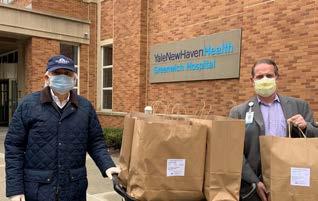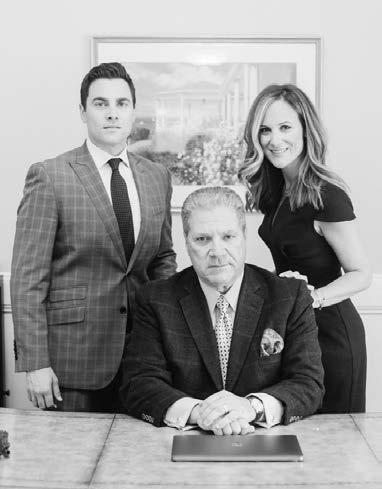
9 minute read
Find your passion
from May 29, 2020
By Meg Allred Finnerud
D o n ’t w e w i s h w e w e r e hearing more of this kind of optimism as the weather around us blessedly eases into spring and a few public spaces open for our enjoyment? Don’t we long for such confidence in the future as many of us go back to work— often leaving our children at home behind us with when we’ve finally had precious time with them? We’re leaving them while still wondering whether their camps and schools will again give them joy? Don’t we wish we’d turn on the news and someone—I mean anyone—would give us this assurance from who-knows-what authority that “all will be well?” So, who actually said this?
Advertisement
I’ll give you a hint. It wasn’t a US President (not even Ronald Reagan even though I would s ay he’d b e a g r e at g ue s s). No, this simple wisdom came from an English woman of the 14th-century named Julian of Norwich—a woman who gave up a place of wealth and privilege for an isolated “religious” life after surviving a life-threatening illness during which God sent her visions. Can we imagine, as we grow so tired of sheltering in our homes, that anyone would choose to isolate-in-place? Mother Julian, as some call her, did just that. And she became one of the most inf luential spiritual leaders of her day even though she had no off icial place in the “Holy Church.” In fact, she represented a threat to the “Church” and its authority. Does she sound more interesting now? I hope so.
In this month of May when w e c e l e b r a t e m o t h e r s a n d caregivers, Julian might seem an odd choice. But as I’ve talked to women in Greenwich— mothers a nd daug hters a nd
All Will Be Well
grandmothers and caregivers— education. Their ability to make I have seen in them the same the best of the situation—whether resilient spirit Julian embodied spiritually or personally— and embraced in the face of their represents the kind of faithful challenges. They have told me strength Julian articulated so of the opportunities of time and many centuries ago. And yet, space the stay-at-home order while spring emerges all around
has g iven them to pray and contemplate. They have talked of more practical challenges like dragging out recipes longdiscarded and mattresses for adult children returning. They have shared how all of these have returned them to an earlier time and role they loved. They are welcoming back husbands who have been rarely at home and spending precious time engaging with their children’s us in Greenwich and things begin to open to us, women who are holding their lives and families together so admirably also know that everything has changed. And it’s not just we women who are looking for evidence to support our own hope that “all will be well.” We are all feeling the need to move f rom mourning the loss of life as we knew it to the hopeful work of building a new future. those who suffer or who work on the front lines. They’re working rig ht now w ith f iref ig hters, police and institutions. They’re at the bedside of the sick and suffering in our hospitals and nursing homes. No matter what faith tradition has formed them, they bring through personal presence t h is message t hat “all will be well.” They convey their understanding that God continues to care and that God cares especially for those who suffer and who in the era of social distancing suffer without the presence of family and friends. I know because I have the (recent) privilege of working with such people at Greenwich Chaplaincy Services (GCS)—a non-prof it formed in 1968 by the interfaith Greenwich Fellowship of Clergy that convenes monthly to this day. Can we imag ine a time when this work could be more needed or appreciated? Does it give us comfort to realize that mother-caregivers in the form of chaplains continue to provide care to those who suffer alone? Do we rea lly wa nt to waste energy arguing about whether it’s religious or spiritual, Jewish or Christian? I don’t think so. I think Julian was right. God just wants us to know “all will be well.”
Mystics exist among us in this town who are quietly and spiritually mothering us all.
R e s t a s s u r e d , w e h a v e “Julians” in Greenwich. Such my s t i c s e x i s t a m o n g u s i n this town who are quietly and spiritually mothering us all. Some, we call chaplains—those who come and literally stand with
Column
The Rev. Meg Allred Finnerud, an Episcopal priest, currently serves as Executive Director of Greenwich Chaplaincy Services. She was ordained a priest in Greenwich in 2014 after a 20-year international career in business development and fundraising.
No Pomp, but Much Circumstance
By Gaby Rattner
Many families, including my own, have had to confront the cancellations or complete reimagining of graduations this year. And it doesn’t matter whether it is an elementary school, high school, Ph.D or religious school commencement. Ceremonies are important and what makes them of such consequence is the presence of those who are most central to your life being there to witness and celebrate with you.
I have been especially struck by the creativity of some schools and families to create different kinds of celebrations to mark this milestone. Automobile parades of graduates, virtual addresses from President and Michelle



Easy
Obama, Oprah Winfrey, Brad Pitt and others, Zoom speeches by valedictorians and salutatorians -- these are wonderful examples of overcoming the obstacles imposed by COVID-19.
So are our graduates really graduating? I hope they feel they are. I hope they can find a way through the disappointment over lost festivities to recognize that the fact of the graduation is what is most meaningful. The milestone is in the work they did and the experiences that brought them to this time. Those experiences will be, now more than ever, critical to a successful future in the uncertain world they are joining.
Many is the student who, especially in times of boredom o r a c a d e m i c s t r u g g l e , h a s q u e s t i o n e d w hy t h e y n e e d to know a particular subject and when they will ever use it in “real life.” The answer, of course, is that in the specifics, the rebellious student may well be right. But graduations, aptly called commencements in that they represent the beginning of
This graduation year is perhaps among the most momentous in a long, long time. And it is my hope that our children feel a well-earned sense of accomplishment and success that that will carry them forward as they bring their skills and talents into the future.
whatever comes next, launch people into the world with the skills developed by persevering through those challenging classes. Graduates possess well developed abilities to research a question, solve a problem, think differently a b out t h i n g s o n e t a ke s fo r

granted, learn from what others are doing, collaborate on projects and more.
T h e w o r l d o f w o r k h a s been changing for well over a generation now. But today, in this moment more than ever, the companies and organizations that

survive will do so because their leaders are applying those skills on a minute-by-minute basis. The creative ones, the ones who have been able to nimbly change bu si ne s s mo del s a nd adapt swiftly, are the ones well poised to earn customer loyalty and survive








Sudoku Answers from page 15. Hard
into a future that will doubtless look different than any past. Likewise, the resilient student who has survived not only the r igors of academ ics but the disappointments of missed prom nights and tossed mortarboards, is the one who is most likely to find success ahead.
Toward the end of the Wizard of Oz, the Wizard bestows gifts to Dorothy’s friends. The gifts, a heart-shaped watch, a medal of honor, and a diploma are standins for the traits each already possesses. Yes, our graduates have been robbed of a public bestowal of their diplomas and meda ls. Robb er y feels ver y personal, and indeed it is. But I would argue that this graduation ye a r i s p e rh ap s a mon g t h e most momentous in a long, long time. And it is my hope that our children feel a well-earned sense of accomplishment, a success that is also very personal and one that will carry them forward as they bring their skills and talents into the future.
Gaby Rattner is Executive Director of Community Centers, Inc.


To contribute to the Greenwich Hospital Foundation, visit giving. greenhosp.org.






THANK YOU TO ALL THE FIRST REPONDERS AND HEALTHCARE PROFESSIONALS ON THE FRONT LINES! WE WERE HAPPY TO HELP AND ARE SO GRATEFUL FOR YOUR DEDICATION.



